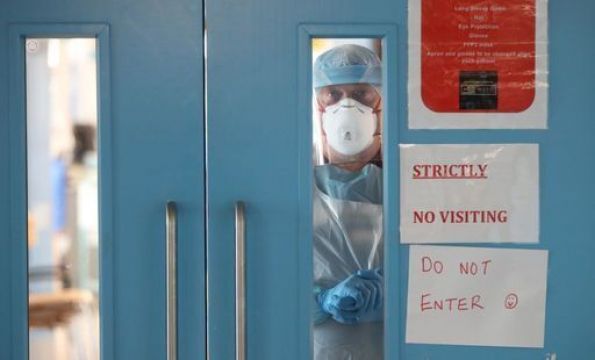While the immediate impact of Covid-19 on our health and daily lives is abundantly clear, there are still plenty of question marks over long Covid and how it will continue to have an impact on people's lives.
The psychological effects are already starting to be seen while how serious an impact it will have on people's health remains to be seen.
Dr Gillian Moore-Groarke, a specialist in health psychology, and Professor Robert Byrne, director of cardiology at the Mater Private Hospital, spoke to BreakingNews.ie about how long Covid is affecting Irish patients.
Dr Moore-Groarke is the psychologist attached to the Bon Secours Hospital in Cork while she also has a private practice in Harley Court, Wilton, Cork.
She has seen the impact of long Covid first hand and has been working with Covid patients since last March.
“As a hospital we have been very much to the forefront of Covid in the sense that we have had quite a significant number of patients who have been long term in the ICU. One patient earlier on spent something like 79 days in ICU and there was quite a lot of public interest.
“Our respiratory physicians have been very outspoken in terms of their involvement. As a psychologist, my first contact with patients were patients referred to me from colleagues in the hospital and I started working with them online, due to infection rates we were being very cautious.”
“There was a pattern starting to emerge with patients presenting with more of the well known symptoms — five or more — generally they were the patients that were presenting with long Covid,” she explained.
Long Covid symptoms
“Patients were re-presenting to the hospital from three weeks up to six months post-Covid with these long Covid symptoms.”
Dr Moore-Groake soon noticed psychological conditions linked directly to long Covid.
These include “anxiety, depression, OCD, pandemic insomnia, brain fog and symptoms of post-traumatic stress disorder”.
“My very first patient was a young student in his 20s, very fit, active guy who was active in sport. The respiratory physician was very concerned when he was going through periods of relapsing and remitting the whole time with ferocious levels of anxiety,” she said.
She said these issues were presenting themselves across the age spectrum.
A lot of patients have said to me that they feel their body is working overtime.
Advertisement
“It’s not just a milder level of anxiety, we’re talking about psychiatric, severe psychological disorders as well. It’s right across the whole age spectrum.
“What I’m finding in clinic day-to-day presentation, the whole pandemic really has made us much more hyper vigilant. Anyone with a bit of vulnerability in terms of a greater capacity to worry, or to be sensitive, are suffering.
“Children are coming into the clinic, there’s a mixture some of them have had Covid, others haven’t, but certainly we are seeing greater levels of anxiety.
“I’ve had a few kids who have had Covid and struggled hugely with the whole going back to school thing. This has led to significant anxiety attacks.
Fear
“The big issue with older people is fear of not being able to breathe normally and the whole thing of getting assistance with breathing in ICU creates a significant amount of fear.
“The inability to breathe normally without a ventilator is certainly increasing palpitations and increasing anxiety attacks. Naturally enough, with anxiety you have it feeding into depression, so it’s a kind of domino effect.”
She added: “There’s definitely a significant amount of anxiety, fatigue and brain fog that keeps recurring.
“A lot of patients have said to me that they feel their body is working overtime. They feel things like they’re out of control in terms of not just their physical body but also in terms of their thought process.
“I have had patients come online to me talking about their nightmares and flashbacks of being in the ICU. Not fully concrete levels of awareness but almost vague images of what they’ve been through.
“Even going through the test and the anxiety of waiting for the result, thankfully results are coming back a lot quicker now but that anticipation in the earlier stages where it was taking a good couple of days for the diagnosis.
“We are learning and making progress. Right across the medical field it’s been a great knowledge base to us despite the fatigue among health care workers.”
She suggested using private mental health practices and practitioners as a way of alleviating the mental health crisis, in the same way private hospitals have been utilised during the pandemic.
'If they had only spent a day in the Covid ward or seen my struggle to breath.’
Dr Moore-Groarke said patients who are suffering with long Covid are even more aware of others who are not following Covid-19 restrictions.
“They are very, very aware. Often older patients are saying to me when they see people not being as vigilant as they should be, they often say to me: 'If they had only spent a day in the Covid ward or seen my struggle to breath’.”
She explained that most long Covid patients who are suffering with psychological problems linked to Covid can be treated with cognitive behavioural therapy, however, others need more in-depth psychotherapeutic therapy.
Dr Moore-Groake feels the impact of the pandemic and long Covid will be a prolonged issue.
Fallout
“I think we will see the fallout of this over the next decade. One of the senior people in a university said to me before Christmas, it’s quite probable we will have students entering third level that will never have a normal college experience.
“I’m also hearing children that are in junior or senior infants, the formative years in school where they learn the basic skills of reading and writing, are going to be very far behind.
“When they get to first, second and third class, the basic skills and foundations haven’t been laid. I’m not faulting anybody for that, teachers have really stepped up to the mark in terms of how they’ve dealt with this. During the second and third lockdown they’ve progressed in terms of being online and online lessons.
“Teenagers have missed out on the normal experiences and rites of passage. What I’m finding in first year students coming into clinics, they had maybe only a couple of months from September to December. It takes a full year to form your friend group when you make that transition from primary to secondary school.
“That’s where we’re also seeing fallout, developmentally if a child lacks in confidence, and they’ve made a few friends in the first semester and haven’t been able to maintain that due to the 5km rule.
“Even with dating, I had a lovely girl on the phone to me today, she had Covid, she’s struggling with long Covid, and she said she had been chatting to someone online but, ‘I don’t know when I’ll be able to meet this person’. “
She concluded: “The older generations will also struggle to go back to their social outlets because they’re fearful. In terms of the younger development I think there will be a huge gap. In psychology when a mental illness hits there’s a term, ‘the patient is no older than the age of onset’.
“I think we’ll see a significant maturity gap with young people, and we’ll see down the road in education a greater need for supports with children suffering with their basic skills.”
Professor Byrne is overseeing the ‘Study of Heart Disease and Immunity After Covid-19 in Ireland’, also known as the SETANTA study, the first research study of its kind in Ireland.
Over the next six months, researchers will invite a sample of 100 patients who have recovered from the Covid-19 virus to participate in a cardiac screening to determine what proportion of those could have long-term changes in their heart muscle.
The research has been designed to help identify any significant or lingering side effects associated with the Covid-19 virus and to help compile data that can be used to adapt clinical practice to best manage the longer-term impacts of the virus.
The study will be carried out by expert cardiology research teams at the CVRI — a new research institute at the Mater Private Hospital Dublin, established in collaboration with the RCSI (The Royal College of Surgeons in Ireland).
Prof Byrne explained: “There was concern from a study from German investigators that was published late in the summer
“They looked at 100 patients, and they found a quite high rate in abnormalities in the heart muscle in people who had recovered from Covid, the majority of whom had quite a mild Covid and didn’t require admission to hospital.
“That was a surprising finding because it didn’t necessarily tally with our clinical experience from patients that we had seen who recovered from Covid.
“We decided it would be good if we could replicate their findings in an Irish population and that’s why we designed the Setanta study.”
While the patients Prof Byrne deals with usually suffer with cardiac issues, two GP practices in south Dublin contacted patients who had suffered with Covid to see if they would be willing to take part to achieve a broader subset of people.
Interim data
There are already 30 people involved in the study and Prof Byrne expects interim results in May or June.
“We’d like to get a sample of people who have recovered from Covid and feel well and others who have recovered and have symptoms of long Covid etc, to get an overall idea of the scale of the problem.
“It’s well known that some people have scarring on the lungs after Covid and the question we’re trying to answer is what proportion of people have scarring on their heart muscle.
“The study I mentioned found that 78 per cent of people had some type of abnormality when they did a high resolution cardiac scan following recovery.”
Prof Byrne explained that the most worrying factor was that some of the heart muscle issues were so subtle that they were not picked up in regular cardiac MRIs.
“They were subtle changes, changes that you wouldn’t see with the normal cardiac scans that we do. We do a thing called a cardiac MRI which is a very detailed analysis of the heart muscle. Even using a normal cardiac MRI, you wouldn’t see some of these changes. They used research protocols to look at subtle abnormalities in pixels of the scan and they did find abnormalities.
“We don’t really know what the impact of those is. Maybe it indicates mild scarring of the heart which would not cause long term difficulties, and would allow long Covid patients to make a full recovery, or maybe it’s a precursor that unfortunately these people have scars, and it will take a couple of years before their heart muscle fully regenerates.
“At the moment when people come to us with long Covid we tend to do some cardiac monitoring, we do an ultrasound of the heart and most of the time we don’t find anything.
“If we find more subtle scarring we’ll have to decide how to approach it. We have treatments because heart scarring occurs after heart attacks and other types of heart disease, so we would apply these for people who have scarring from Covid and we will then see if it is beneficial for them.
“We’ve been overwhelmed with enthusiasm, we started out with two GP Practices in south Dublin and we had 60 or 70 volunteers straight away, that’s great to see.”
Heart rate
In terms of long Covid, Prof Byrne hopes the SETANTA study will give doctors a better insight.
In terms of cardiac health in Covid patients at the moment, he revealed a slightly faster heart rate has been identified in patients, sometimes leading to fatigue and breathlessness.
Like Dr Moore-Groarke, he is hopeful that constantly improving knowledge of Covid and long Covid will continue to help doctors and patients.







